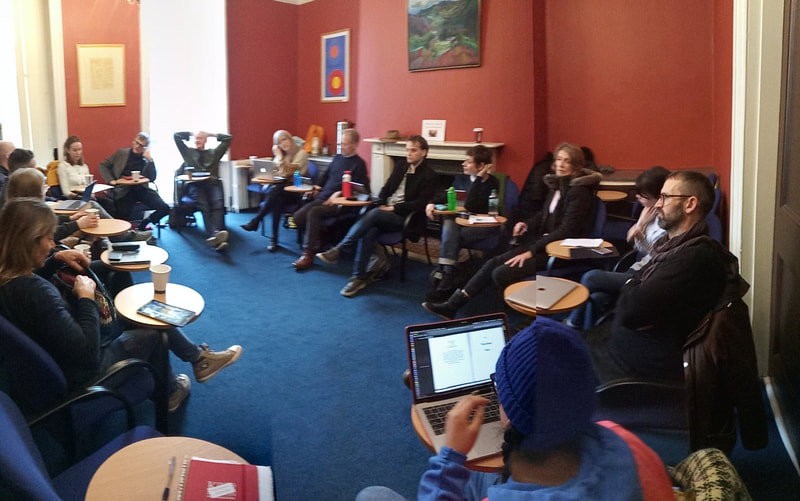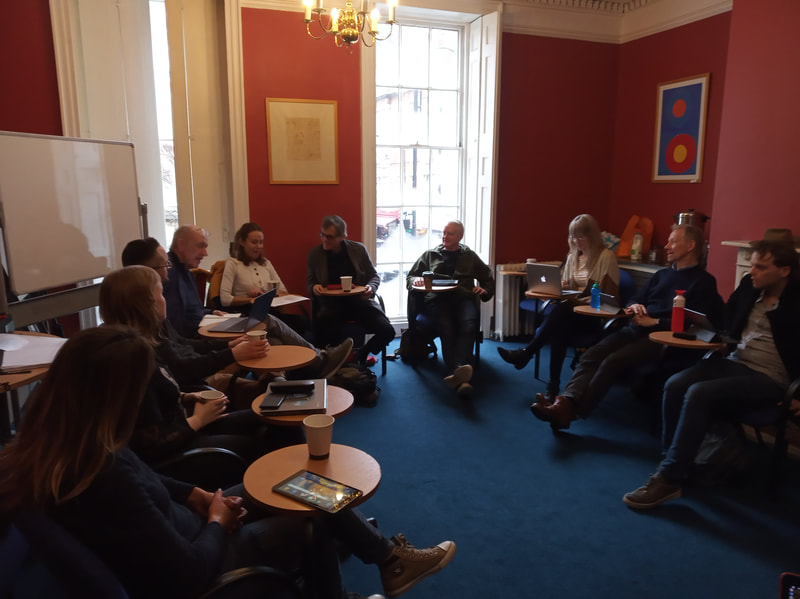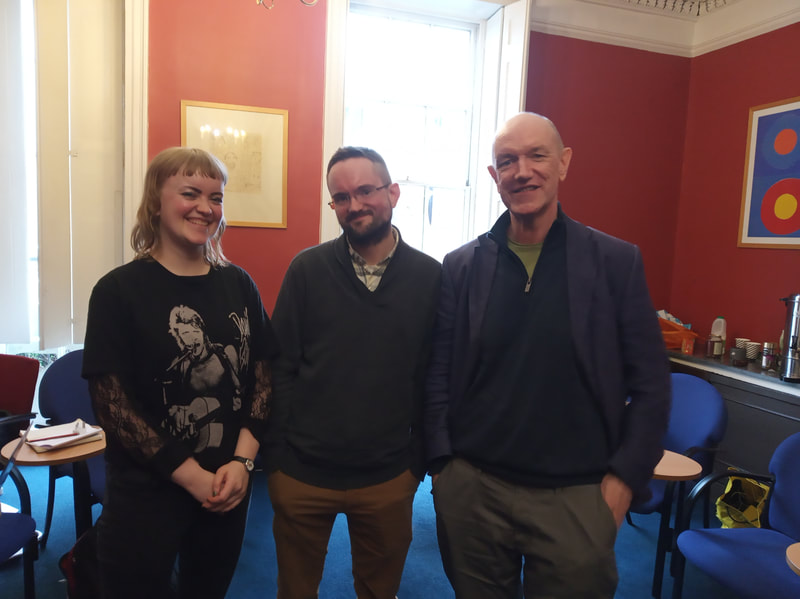|
The Presence Actors’ Monthly Play Reading Group Feb 28th….and beyond.
Two great days of script exploration at Presence, this time in partnership with our good friends at Unge Viken Theater in Lillestrom, Norway. On Friday our regular play reading group on at the IES centre in Holborn, welcoming playwright Regine Rossnes and Unge Viken’s dramaturg Oystein Brager to hear Regine’s play Exposed. Then on Saturday heading to Theatre Delicatessen’s brilliant re-purposed space in the City of London for a full day’s exploratory work on the script with performance students from Rose Bruford College Friday, The Presence Actors’ Play Reading Group Friday’s session began with an almost-full house of reading group regulars, and with Oystein and Regine from Unge Viken still hurtling along the Piccadilly Line, their early morning flight from Olso having been slightly delayed. While waiting for them we started with Gregory Motton’s 2017 A Worthless Man. It’s a challenging, complex script, and as such warrants close and detailed consideration: The following is not that, but rather preliminary reflections drawn from hearing the play read aloud on Friday. The play is a series of interweaved stream-of-consciousness monologues: Two families, one working class, one kind-of bohemian bourgeois (both denominations not quite adequate in the plays mapping of a polarising social landscape). Each family consists of a mother, father and just-grown-up daughter, and all are notionally in bed alone in the moments before sleep, remembering their day and reflecting on their relationships with each other and with the wider world. What begins as class satire, ends in existential despair (or at the most optimistic, as a bleak call to arms). Extraordinarily vivid metaphors bubble into the monologues ultimately threatening to un-seam the fiction, leading us progressively from the astute revelation and pointing of attitudinal absurdity into richer, darker territory. It’s as if the characters, on their way to sleep, become latterly themselves dreamt, and by an imagined consciousness in melt-down, or one achieving a very primary sort of creative clarity. Hieronimo may or may not be mad again. The father of the more ‘upscale’ family is a marketing executive-cum-college lecturer who deploys management-speak conceits with an impressive but sinister grace. Progressively he is revealed as a demented identity-fascist, striving for a book-burning Year Zero of continual revolution, all history, and all material and biological reality, nullified in the cause of extreme libertarian self-reinvention. All, that is, apart from the ethnic, gender and cultural identities that form the cornerstones of current identity politics, to which he offers a pious obeisance. The contradictions here are clearly part of the satirical point. The mother craves ‘experience’ at any cost (the cost being always on other people’s tabs) up to and including cannibalism; the daughter amuses herself by inventing bizarre self-identities while crassly overriding the obvious and painful material and economic conditions endured by those less fortunate than herself. In fact the whole family in their enormous sense of entitlement are utterly oblivious to the material and cultural resources that underpin their narcissistic gravity-free posturing. If the play’s posh family strive for continual cultural revolution, the other, or at least its father figure (an ex-miner turned septic tank engineer), dream ineffectually of real political and socio-economic insurrection. For them, the despair is borderline existential and Motton’s portrayal is fundamentally empathetic. The play’s starkest and bleakest metaphors surely belong to this family’s daughter Frizzy, who keens at the meaninglessness of words as an alienating tsunami of bad-faith noise. She likens herself at one point to a self-ravishing nun (not sure that one quiet works, but it somehow does in the play’s almost psychedelic later stages). The insidious and alienating bad faith of language is a key focus throughout, as the satire gradually straitens and dissolves into spectral bleakness, before finally shuddering to a conclusion with a gesture that can only be termed, oxymoronically, sublime bathos. On Friday the reading began with a savouring of the social satire and absurdity before slowly retracting into something less certain (while maintaining a commendable richness of characterisation and relish of language) as we realised we weren’t in Kansas any more. Surely this is the exact trajectory that any production should seek to induce in the audience, as the sarky anger and subversive mischief of the opening become cut with pain and finally bitter despair. At the end, words kind of failed us (as the play surely prescribes….). Motton might be both Caryl Churchill’s lost dark twin and also possibly her worst nightmare. Chastening. As we entered the final pages of A Worthless Man, and with immaculate timing, the Norwegians arrived. Regine Rossnes is a slam poet, and her play Exposed, newly translated with scary slam-aplomb by Neil Howard, is set in a Norwegian high school where new student and free spirit Eili’s sexual indiscretion with her recently-ex boyfriend’s (possibly ‘supposed’ boyfriend’s ) best friend gets uploaded and shared around Snapchat, with devastating effect. If, for Motton, words are simply lies, for Rossnes, they are ultimately valid instruments of expression and potential moral good, and her play accordingly offered a contrast to the near-despair of A Worthless Man. Exposed is a play where moral choices are difficult but conditionally valid, and positive trajectories at least not out of the question. Short stark duologues and trios alternate with slam-poetic interior monologues, embodying a world of intense group loyalties under pressure from new adolescent feelings, experiences and temptations. The ending of the play offers a positive way forward for the characters that is (deliberately) troubled and troubling, but made possible at all through a central and defining act of bravery and solidarity on the part of the two main ‘wronged’ characters. Calibrating that marginally-positive ambivalence, while also mapping the intense shifting emotions and impulses (in all the characters not just the easier-to-like protagonists) that lie beneath the play’s explicit teenage censoriousness, is surely the play’s central endeavour. Our reading yielded some fascinating discoveries. Of course this is a spontaneous reading, and expecting full-on emotional availability in such circumstances is of course mad, but perhaps there is also something else going on here. No-one in the group is in the right age range of course (sixteen to eighteen), hence perhaps a slight hesitation to inhabit and internalise the required teenage argot and emotional world. Our culture’s centre of gravity now is arguably the teenager, so the attempt of anyone over the age of twenty to fully commit to a teenage structure of feeling or (related) means of expression maybe feel like an act of aspirational delusion. On the other hand it might be that the teenage ‘identity’ is even more fraught with posturing, self delusion and protective cliche than the ‘adult’ one, and this triggers the reluctance of more world-wise and absurdity-wary adults to engage other than ironically. Or maybe teenaged earnestness – or all earnestness (and teenaged earnestness is surely the purest kind…) - is tricky, in our cynical and wary culture. Anyway, fascinating. What the reading also reveals, I think, is that beneath the play’s teenaged hedging and posturing (and the play seems to delicately map many such manoeuvrings) lies a well of unconditional, categorical, intense and authentic feelings. It is in fact this ‘charged’ reservoir or root that infuses the script with its poetry (one key strain of poetry surely being by definition instances of simple language and gesture containing or restraining complex, rich, intense ambivalent feeling) and such is evidence in Exposed, as much in the short, terse dialogue exchanges as it its explicitly ‘poetic’ inner monologues. Rendering the former ‘conversational’ (as seemed understandably sometimes the intuitive tactic in the reading) doesn’t quite seem to work. For one thing it disguises the various genuinely (and beautifully defined in the script) failed ‘conversational’ gambits in each exchange that are eviscerated in almost every case by the characters’ emergent deep feeling. For another, it simply dislocates the link to that underlying ‘root’ of feeling that sharpens the exchanges. If the play’s poetic language of the ‘slam’ monologues is about emotional expression, its poetry of the dialogues is about the containment of emotion. Thinking of this ‘teen-spirit’ – expressed AND contained - I kept thinking of the way actors tap into and inhabit the (to us as contemporary adults) in some ways equally ‘alien’ unconditional and emotionally-absolutist worlds of Lorca’s plays or of the Spanish Golden Age writers. Such clarifications and hunches are of course made possible through the wonderful glittering, ‘tessellating’, multi-faceted and multi-voiced instrument that is the Presence play reading group… After the reading, a wonderfully energised discussion ensues around the issues arising in the play, such as the ethics of image-appropriation in relation to the demands of ‘old fashioned’ sexual morality; and the crudeness of the tools currently used by adults to manage this kind of teenage behaviour, tools such as the legal system that inappropriately scar both victim and perpetrator in non-proportionate ways. Whatever else the virtues of the play, it absolutely – and necessarily - touches a very sensitive and current cultural nerve. After a late (and short) lunch we reconvene to read Lucy Kirkwood’s 2012 Royal Court NSWF, in which a ‘lads mag’ publishes a photo of the breasts of a fourteen-year-old girl without checking her age, and her father subsequently arrives at the magazine’s offices. As with Exposed, we have here the exploitation without consent of an underage sexual image, but the lens is very different. Instead of starkness and poetry we have an extremely focused, sharp and very telling satire on hypocrisy and venality. Not unlike the Motton, but with a more defined strategy of attack and without the incipient existential despair. Here the hypocrisies and MOs of the (2012) popular media are used as a way of exposing a society built entirely around the commodification of everything for financial gain: innocence, desire, family relations, the body, intimacy. The third act is set in the offices of a new women’s magazine where similar strategies are deployed: a plague then on both your gender identities… the issues are therefore ultimately posited as being of class and culture rather than gender-related. The play is a riotous read, and with some very deft and clever performances in evidence as the roles circulate round the group. After that, to the pub
0 Comments
Leave a Reply. |
INDEX of dates:
INDEX of playwrights and plays:
INDEX of contributors:
|



 RSS Feed
RSS Feed
